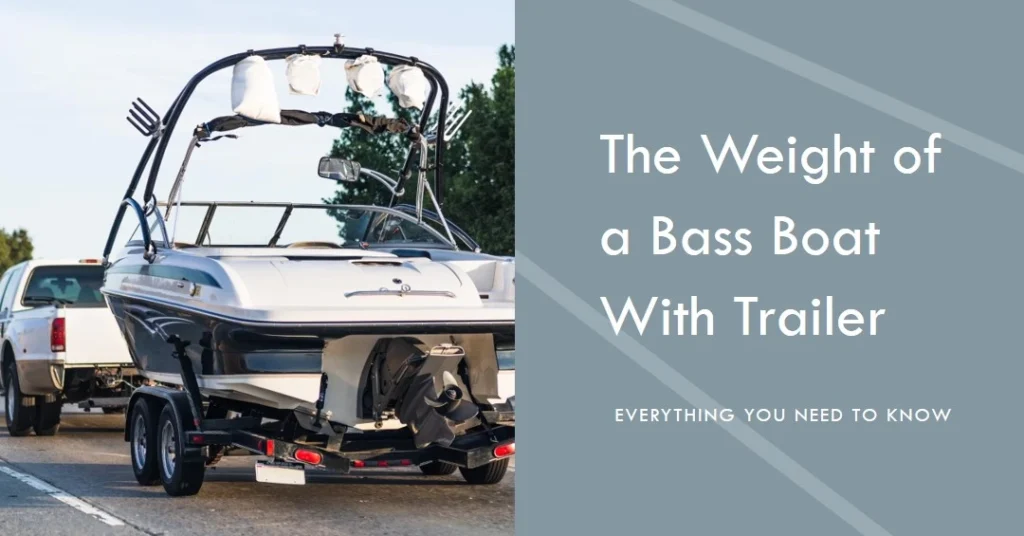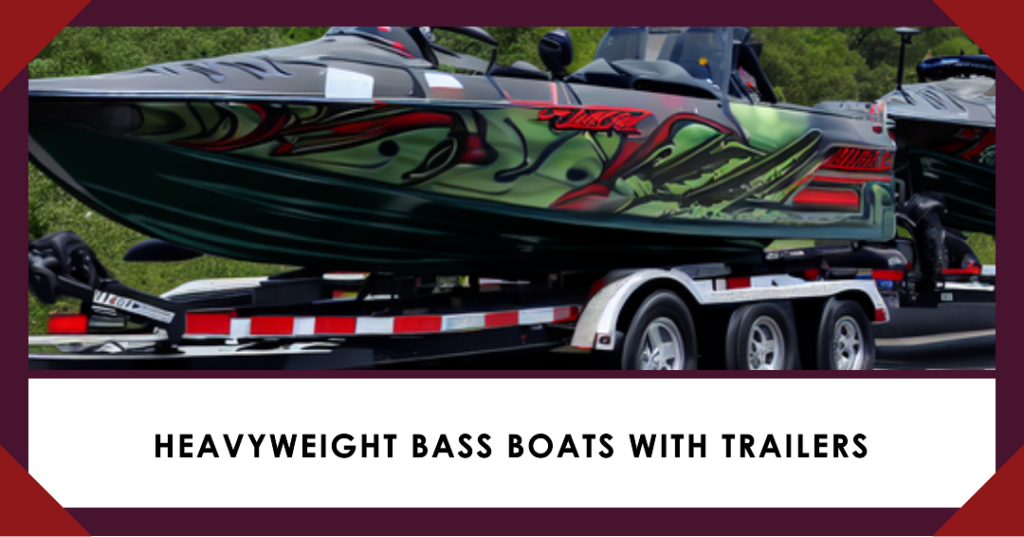A bass boat weighs approximately 1,500 to 2,500 pounds with a trailer. Bass boats are popular among fishing enthusiasts due to their versatility and maneuverability.
You can try: Bass Weight Calculator
Whether you’re targeting largemouth bass in shallow water or exploring deeper lakes for smallmouth bass, having a reliable boat is crucial.
But before heading out for your next fishing adventure, it’s essential to understand the weight of your bass boat with the trailer.
Knowing this information is not only necessary for towing purposes but also for adhering to local road regulations.

In this guide, I’ll take a closer look at how much a bass boat typically weighs with a trailer, ensuring you’re well-prepared before hitting the water.
Table of Contents
- Design And Construction Materials
- Boat Dimensions And Accessories
- Engine Type And Size
- Fuel And Water Capacity
- Gross Vehicle Weight Rating (Gvwr)
- Weighing The Boat And Trailer Separately
- Calculating The Total Weight
- Data On Popular Bass Boat Models
- Lightweight Bass Boats With Trailers
- Heavyweight Bass Boats With Trailers
- Effects On Boat Performance
- Towing Considerations
- Frequently Asked Questions:
- Conclusion
Design And Construction Materials
Bass boats with trailers vary in weight depending on their design and the construction materials used.
Common materials found in bass boat and trailer construction include aluminum, fiberglass, and composite materials. The weight of a bass boat is influenced by the choice of these materials.
Aluminum is known for being lightweight and durable, making it a popular choice for bass boat construction. Fiberglass is also used for its strong and lightweight properties.
Composite materials, which are a combination of different materials, can also be used to reduce weight while maintaining strength.
The choice of construction materials for both the boat and trailer can significantly impact the overall weight.
Boat Dimensions And Accessories
A bass boat with a trailer can vary in weight depending on its dimensions and accessories. The length and width of the boat play a significant role in determining its overall weight. Additionally, the types of accessories added to the boat can also add to its weight.
Common accessories include trolling motors, depth finders, livewells, and fishing chairs. Moreover, additional features like rod storage compartments, baitwells, and built-in coolers can increase the boat’s weight.
When considering the weight of a bass boat with a trailer, it’s crucial to take into account these dimensions and accessories, as they can affect the towing capacity and overall performance of the boat.
By understanding the boat’s weight, anglers can ensure they have the appropriate equipment and vehicle to transport it safely and efficiently.
Engine Type And Size
Different types of engines can be used in bass boats, which can have an impact on their overall weight. Engine size and type are important factors to consider when determining the weight of a bass boat with a trailer.
Smaller engines tend to be lighter and therefore contribute less to the overall weight of the boat and trailer.
On the other hand, larger engines, such as those with higher horsepower, can add significant weight to the boat.
It’s important to choose an engine that suits your needs and preferences while also considering the weight implications.
Fuel And Water Capacity
Bass boats equipped with trailers vary in weight depending on the fuel and water storage capacities. The weight of a bass boat can increase significantly with the amount of fuel and water it can carry. The more fuel and water a boat can store, the heavier it becomes.
The additional weight can impact the overall towing capacity of the trailer and may require a stronger towing vehicle. It is important for boat owners to consider the weight implications of fuel and water storage when choosing a bass boat.
The weight of the boat and trailer combination will affect fuel efficiency, handling, and maneuverability on the water.
Therefore, knowing how different capacities affect the overall weight is essential for a smooth and safe boating experience.
Gross Vehicle Weight Rating (Gvwr)
The gvwr is the maximum weight that a vehicle can carry, including its own weight, passengers, and cargo. It is important because exceeding the gvwr can lead to safety hazards and damage to the vehicle.
To calculate the total weight of a bass boat with a trailer, one must consider the weight of the boat itself, the weight of the trailer, and any additional equipment or gear on board.
By adhering to the gvwr guidelines, boaters can ensure that their bass boat and trailer combination remains safe and manageable on the road.
Proper weight distribution and regular maintenance are also essential for smoother and more enjoyable boating experiences.
Weighing The Boat And Trailer Separately
When weighing a bass boat with a trailer, it’s important to measure them separately for accuracy. To determine the weight of the boat, position it on an industrial scale designed for heavy loads. Make sure the boat is empty and remove any extra equipment.
To measure the weight of the trailer, you can use a separate scale or a vehicle scale. Drive the trailer onto the scale and ensure it is fully loaded with all the necessary accessories.
Calculating The Total Weight
To calculate the total weight of a bass boat with a trailer, you need to add the weight of the boat and trailer. The weight of a boat can vary, depending on its size, materials used, and additional features. On average, a bass boat can weigh between 1,000 and 2,500 pounds.
However, larger bass boats with more powerful engines can weigh up to 5,000 pounds or more. When it comes to the trailer, its weight will depend on the trailer type and material. Typically, boat trailers can weigh around 400 to 1,500 pounds.
To get the total weight, simply add the weight of the boat to the weight of the trailer. This information is vital for anyone planning to transport a bass boat, as it helps determine the appropriate vehicle and equipment needed for safe and efficient transportation.
Data On Popular Bass Boat Models
Bass boat weights can vary among popular models, and it’s important to consider the trailer weight as well. Comparison across different models reveals various factors contributing to these variations. For instance, the size and materials used in construction play a significant role.
Moreover, additional features and accessories, such as trolling motor and fish-finding equipment, can add to the overall weight. Additionally, variations in engine size and fuel capacity can also impact the total weight of the boat.
Therefore, it is essential to research and gather precise data on the specific bass boat model you are interested in before making a purchase.
Lightweight Bass Boats With Trailers
Lightweight bass boats with trailers are becoming increasingly popular among enthusiasts. They offer numerous benefits that appeal to both seasoned anglers and beginners. These boats are designed to be lighter, making them easier to tow and maneuver. The reduced weight also means less strain on your vehicle, resulting in better fuel efficiency.
Moreover, launching and retrieving the boat becomes a breeze with a lighter trailer. Another advantage of lightweight bass boats is their improved speed and performance on the water. With less weight to carry, these boats can achieve higher speeds and provide a thrilling experience for avid anglers.
Some top options for lightweight bass boats include brands like nitro, ranger, and skeeter. So, if you’re in the market for a bass boat that is easy to transport and offers exceptional performance, consider opting for a lightweight model with a trailer.
Heavyweight Bass Boats With Trailers

Bass boats with trailers can vary in weight, with some weighing around 1,500 to 2,500 pounds. Heavier boats have their advantages, such as increased stability and improved handling in rough waters. The extra weight helps to combat the impact of waves and wind, ensuring a smoother ride for anglers.
Furthermore, heavier boats are typically equipped with stronger motors, allowing them to reach higher speeds and tackle larger bodies of water. The added weight also contributes to increased buoyancy, making it easier to navigate through choppy conditions. When it comes to choosing a heavyweight bass boat, top options include brands like nitro, ranger, and skeeter.
These models are designed to accommodate the weight of the boat and the trailer, ensuring a safe and reliable fishing experience.
Effects On Boat Performance
A bass boat’s weight with a trailer has a significant impact on its performance. The boat’s speed and agility are directly influenced by its overall weight when towing. A heavier boat may result in slower speeds and reduced maneuverability on the water.
Additionally, fuel efficiency can be affected by the weight of the boat with the trailer. Heavier boats tend to consume more fuel, as the engine needs to work harder to propel the boat through the water.
Therefore, it is important to consider the weight of a bass boat with a trailer when making purchasing decisions, as it can have a noticeable effect on the boat’s performance and fuel consumption.
Towing Considerations
Towing considerations play a crucial role when it comes to determining the weight of a bass boat with a trailer. Understanding safe towing weights is essential for both the vehicle’s performance and safety. The weight of the boat and trailer can have a significant impact on how your vehicle handles on the road.
It is important to ensure that your vehicle is capable of safely towing the bass boat without causing strain or compromising its ability to maneuver effectively. By knowing the weight of the bass boat with the trailer, you can make informed decisions about the vehicle you use for towing, as well as the necessary equipment and precautions to take.
The right towing setup will ensure a smooth and secure journey, minimizing risks and maximizing your overall towing experience.
Frequently Asked Questions:
How Much Does A Typical Bass Boat Weigh With Trailer?
A typical bass boat weighs around 1,500 to 2,500 pounds with the trailer included. However, the weight can vary depending on the specific make, model, and size of the boat.
What Factors Affect The Weight Of A Bass Boat With Trailer?
The weight of a bass boat with trailer can vary based on factors such as the boat’s size, construction materials, additional accessories, and the type of trailer used. All these aspects contribute to the overall weight.
Is It Important To Consider The Weight Of A Bass Boat With Trailer?
Yes, it is essential to consider the weight of a bass boat with the trailer to ensure safe transportation. Exceeding the trailer’s weight capacity can lead to performance issues, increased fuel consumption, and potential damage to the trailer or towing vehicle.
How Does The Weight Of A Bass Boat With Trailer Impact Towing?
The weight of a bass boat with a trailer affects the towing experience. Heavier boats may require a more substantial towing vehicle, while overloaded trailers can compromise stability and control. Understanding the weight is crucial for selecting appropriate towing equipment.
Are There Legal Weight Limits For Bass Boats With Trailers?
Yes, most jurisdictions have legal weight limits for towing vehicles and trailers. It is important to know and adhere to these regulations to ensure compliance and safety when towing a bass boat with a trailer.
Can I Find The Weight Of A Bass Boat With Trailer In Its Specifications?
Yes, most manufacturers provide the weight of their bass boats, including the trailer, in the specifications. You can refer to the boat’s owner’s manual, manufacturer’s website, or contact the manufacturer directly to obtain accurate weight information.
Conclusion
Understanding the weight of a bass boat with a trailer is essential for transportation and safety purposes. Knowing the weight can help you choose the right vehicle to tow it and ensure that you are within legal limits.
Additionally, having knowledge about the weight distribution and the importance of properly balancing the load is crucial to prevent accidents and damage to both the boat and the trailer.
Keep in mind that the weight of a bass boat can vary depending on the size, accessories, and materials used. Therefore, it is recommended to consult the manufacturer’s specifications or seek professional advice to determine the exact weight.
